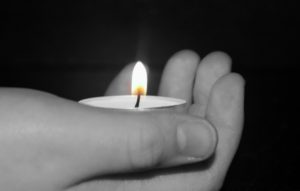The events of 9/11 seem not that long ago to me. I can remember my two reactions when the twin towers were hit by planes. The first one was wondering how bad of a pilot that someone might have to be to hit a building. I’d been walking hall duty when my partner, Teresa Brinkerhoff, informed me that one had hit the World Trade Center. It didn’t cross my mind what a plane hitting a building could do to it, and I wasn’t aware it was a passenger plane.
Just a few minutes later I saw her again in the hallway. She told me the news, and I was dumbfounded. The other two planes are a blur in memory, and the next several days, the image of the two falling towers scorched my memory as I watched them countless times on the news. I remember thinking to myself that I hoped this didn’t affect the Muslim InterVarsity Ministry on Wichita State University’s campus, and I hoped people could come together in the tragedy. I also remember thinking that I felt then President Bush did a decent job under the circumstances.
After the initial first responders, clearing of the rubble, candlelight vigils, and the collective cultural vibe that something needed to be done about terrorism, plans began for the invasion of Iraq. Several years afterward I visited New York in the midst of plans being made to reconstruct the World Trade Center space, and I can remember how long I thought it was taking. Looking back, the attack itself doesn’t seem terribly long ago. Funny how time provides perspective.
I remember the initial sense of unity that we from Wichita, KS. sensed with New York, D.C and Pennsylvania, and the rest of the world, or what seemed so, joining us in solidarity. As I reflect back on that, I realize that the unity is there all the time, though sometimes buried. I felt it with other locations during ensuing attacks, including the London Subway, and much later Charlie Hebdo. But I’ve also felt the unity during times of peace. This summer in France I celebrated with Parisians as they defeated Germany in a  soccer match.
soccer match.
Though 9/11 is forever etched in my memory, I also find myself thinking of it as one attack that is birthed in an ideology that sees my country and other western countries as inherently evil. The ideology holds certain violence as positive and honorable and promises happiness and fulfillment in regard to obedience and adherence to its ideology.
There are people smarter than me working on how to fight this. One way is with weapons, and I’m not opposed to this, although I don’t think it will completely terminate the movement. Another way, albeit a very slow one, is through reaching out to others. On one hand I am a strong believer in dialogic communication. On the other, I’ve watched U.S. Presidents attempt to broker peace between Palestine and Israel unsuccessfully for years, so it’s difficult to imagine either influencing violent ideologies to peace, or managing to encourage self-reflection in the U.S. concerning our own perpetuating violence.
Either way, remembering the horrific events fifteen years ago is part of our grieving process and has the capacity to bring solidarity and peace in the midst of what is happening in our domestic climate. Like the Olympic games not long ago, between now and early November we can use whatever good vibrations that can be mustered in our present culture of conflict and shaming.
